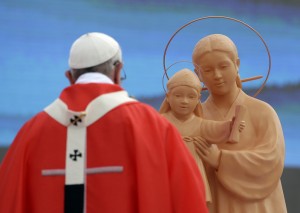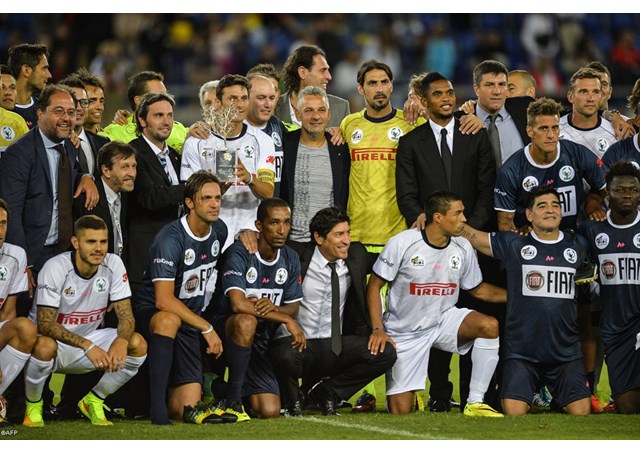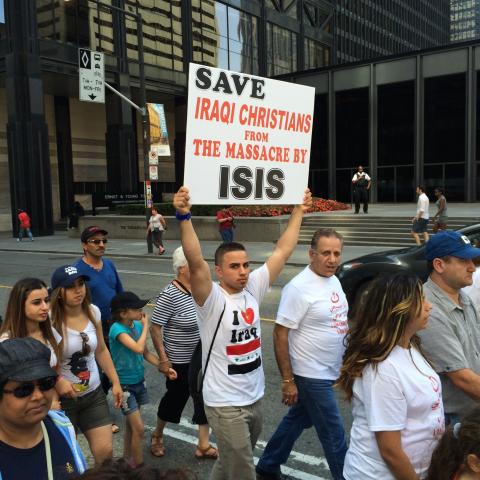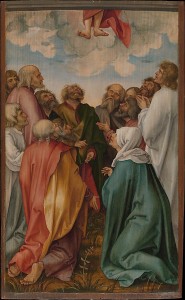 The Holy Father highlights the need for reconciliation, which is of particular concern for the future of the Korean peninsula.
The Holy Father highlights the need for reconciliation, which is of particular concern for the future of the Korean peninsula.
Dear Brothers and Sisters,
As my stay in Korea draws to a close, I thank God for the many blessings he has bestowed upon this beloved country, and in a special way, upon the Church in Korea. Among those blessings I especially treasure the experience we have all had in these recent days of the presence of so many young pilgrims from throughout Asia. Their love of Jesus and their enthusiasm for the spread of his Kingdom have been an inspiration to us all.
My visit now culminates in this celebration of Mass, in which we implore from God the grace of peace and reconciliation. This prayer has a particular resonance on the Korean peninsula. Today’s Mass is first and foremost a prayer for reconciliation in this Korean family. In the Gospel, Jesus tells us how powerful is our prayer when two or three of us join in asking for something (cf. Mt 18:19-20). How much more when an entire people raises its heartfelt plea to heaven!
The first reading presents God’s promise to restore to unity and prosperity a people dispersed by disaster and division. For us, as for the people of Israel, this is a promise full of hope: it points to a future which God is even now preparing for us. Yet this promise is inseparably tied to a command: the command to return to God and wholeheartedly obey his law (cf. Dt 30:2-3). God’s gifts of reconciliation, unity and peace are inseparably linked to the grace of conversion, a change of heart which can alter the course of our lives and our history, as individuals and as a people.
At this Mass, we naturally hear this promise in the context of the historical experience of the Korean people, an experience of division and conflict which has lasted for well over sixty years. But God’s urgent summons to conversion also challenges Christ’s followers in Korea to examine the quality of their own contribution to the building of a truly just and humane society. It challenges each of you to reflect on the extent to which you, as individuals and communities, show evangelical concern for the less fortunate, the marginalized, those without work and those who do not share in the prosperity of the many. And it challenges you, as Christians and Koreans, firmly to reject a mindset shaped by suspicion, confrontation and competition, and instead to shape a culture formed by the teaching of the Gospel and the noblest traditional values of the Korean people.
In today’s Gospel, Peter asks the Lord: If my brother sins against me, how often must I forgive him? As many as seven times? To which the Lord replies: Not seven times, I tell you, but seventy times seven (Mt 18:21-22). These words go to the very heart of Jesus message of reconciliation and peace. In obedience to his command, we ask our heavenly Father daily to forgive us our sins, as we forgive those who sin against us. Unless we are prepared to do this, how can we honestly pray for peace and reconciliation?
Jesus asks us to believe that forgiveness is the door which leads to reconciliation. In telling us to forgive our brothers unreservedly, he is asking us to do something utterly radical, but he also gives us the grace to do it. What appears, from a human perspective, to be impossible, impractical and even at times repugnant, he makes possible and fruitful through the infinite power of his cross. The cross of Christ reveals the power of God to bridge every division, to heal every wound, and to reestablish the original bonds of brotherly love.
This, then, is the message which I leave you as I conclude my visit to Korea. Trust in the power of Christ’s cross! Welcome its reconciling grace into your own hearts and share that grace with others! I ask you to bear convincing witness to Christ’s message of forgiveness in your homes, in your communities and at every level of national life. I am confident that, in a spirit of friendship and cooperation with other Christians, with the followers of other religions, and with all men and women of good will concerned for the future of Korean society, you will be a leaven of the Kingdom of God in this land. Thus our prayers for peace and reconciliation will rise to God from ever more pure hearts and, by his gracious gift, obtain that precious good for which we all long.
Let us pray, then, for the emergence of new opportunities for dialogue, encounter and the resolution of differences, for continued generosity in providing humanitarian assistance to those in need, and for an ever greater recognition that all Koreans are brothers and sisters, members of one family, one people.
Before leaving Korea, I wish to thank the President of the Republic, the civil and ecclesiastical authorities and all those who in any way helped to make this visit possible. I especially wish to address a word of personal appreciation to the priests of Korea, who daily labor in the service of the Gospel and the building up of God’s people in faith, hope and love. I ask you, as ambassadors of Christ and ministers of his reconciling love (cf. 2 Cor 5:18-20), to continue to build bridges of respect, trust and harmonious cooperation in your parishes, among yourselves, and with your bishops. Your example of unreserved love for the Lord, your faithfulness and dedication to your ministry, and your charitable concern for those in need, contribute greatly to the work of reconciliation and peace in this country.
Dear brothers and sisters, God calls us to return to him and to hearken to his voice, and he promises to establish us on the land in even greater peace and prosperity than our ancestors knew. May Christ’s followers in Korea prepare for the dawning of that new day, when this land of the morning calm will rejoice in God’s richest blessings of harmony and peace!
Amen.
 You’ve no doubt heard about The Faith Explained Conference this Saturday, Sept. 27, featuring Cardinal Thomas Collins, Dr Craig Evans, and me. If you don’t have tickets yet, grab them at this link: http://goo.gl/Rdgl6M, but hurry, as online sales will end soon.
You’ve no doubt heard about The Faith Explained Conference this Saturday, Sept. 27, featuring Cardinal Thomas Collins, Dr Craig Evans, and me. If you don’t have tickets yet, grab them at this link: http://goo.gl/Rdgl6M, but hurry, as online sales will end soon.

 The Faith Explained Conference on September 27 (go here for tickets: http://goo.gl/Rdgl6M) is fast approaching, and I can’t wait! As we explore our conference theme of “Jesus: Yesterday, Today, and Forever” (Hebrews 13:8), we’ll be spending some time in the presentations on apologetics – offering a reasonable basis for Christian faith.
The Faith Explained Conference on September 27 (go here for tickets: http://goo.gl/Rdgl6M) is fast approaching, and I can’t wait! As we explore our conference theme of “Jesus: Yesterday, Today, and Forever” (Hebrews 13:8), we’ll be spending some time in the presentations on apologetics – offering a reasonable basis for Christian faith. Yes, that Diego Maradona, he of the infamous “Hand of God” goal in the ’86 World Cup. Maradona was in Rome Monday night not simply to see his fellow Argentine Pope Francis, but to play, along with other futbol luminaries Javier Zanetti and Roberto Baggio, in a unique event billed as an “Interreligious Match for Peace”. Zanetti indicated that the “friendly”, played in front of a huge crowd at Rome’s Olympic stadium, was the “express wish of Pope Francis” who wanted to show the power of sport for building bridges of peace.
Yes, that Diego Maradona, he of the infamous “Hand of God” goal in the ’86 World Cup. Maradona was in Rome Monday night not simply to see his fellow Argentine Pope Francis, but to play, along with other futbol luminaries Javier Zanetti and Roberto Baggio, in a unique event billed as an “Interreligious Match for Peace”. Zanetti indicated that the “friendly”, played in front of a huge crowd at Rome’s Olympic stadium, was the “express wish of Pope Francis” who wanted to show the power of sport for building bridges of peace.


 Following talks that I’ve given lately, I’ve fielded a lot of questions about the persecution of Iraqi Christians. All of us have been horrified by what we’ve heard; very often we’re at a loss about what to do. Josh Canning over at
Following talks that I’ve given lately, I’ve fielded a lot of questions about the persecution of Iraqi Christians. All of us have been horrified by what we’ve heard; very often we’re at a loss about what to do. Josh Canning over at  The Holy Father highlights the need for reconciliation, which is of particular concern for the future of the Korean peninsula.
The Holy Father highlights the need for reconciliation, which is of particular concern for the future of the Korean peninsula.
 Q. What are some things we can learn from this Sunday’s Feast of the Ascension of the Lord?
Q. What are some things we can learn from this Sunday’s Feast of the Ascension of the Lord?